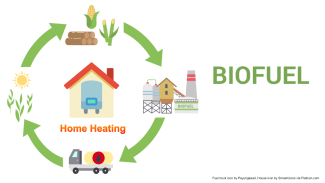Biofuel
Biofuels are made from biological matter, such as plants or animal waste. Some biofuels—in particular, some biodiesels—can be used as heating oil for buildings. These biodiesels are often made from vegetable oils, animal fats, and/or algae. Burning biofuels releases greenhouse gases, but still creates substantially fewer emissions over biofuels’ full lifecycle (from producing to burning them) than traditional fossil fuel-based heating fuels. If harvested, produced, and transported without fossil fuels, biofuels have the potential to be fully carbon neutral. Biofuels made from waste products such as used cooking oil have the added benefit of finding use for something that would otherwise become garbage.

Rhode Island recently committed to increasing the percentage of biofuel included in heating oil to a B50 blend by July 2030. Right now, all oil customers receive a B5 blend, meaning a heating oil blend with 5% biodiesel. This will increase to B10 (10% biodiesel) by July 2023 and steadily increase to B50 (50% biodiesel) by July 2030.
You can contact a local biodiesel supplier and order heating oil with higher biodiesel content, up to B99 (99% biodiesel). For very high biodiesel blends, you may need minor upgrades to your furnace or boiler. We encourage you to speak with a heating-system service provider to see if any adjustments are needed for your system.
Incentive Information
Contact Us
Katherine Critelli
